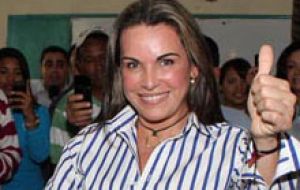MercoPress. South Atlantic News Agency
Chavez wins regional elections but loses second most populated city, Maracaibo
 Evelyn Trejo Rosales next mayor of Maracaibo
Evelyn Trejo Rosales next mayor of Maracaibo Candidates from Venezuelan President Hugo Chavez’s party PSUV won seven municipalities and one state in regional polls, the populist socialist leader’s first test since suffering a setback in September legislative elections, state television reported.
The opposition won in one state and four municipalities, including Maracaibo one of the main cities of the country and capital of the oil and agriculture powerhouse state of Zulia.
Abstention was unusually high, almost 50%, given the state of emergency following floods in several states that have forced 90.000 people to take refuge in government shelters.
In Maracaibo, the Democratic Unity candidate Evelyn Rosales won the office held by her husband, former presidential candidate Manuel Rosales, who he fled to Peru in 2009 alleging political persecution by Chavez. She won 58.68% of the vote, defeating former Mayor Gian Carlo Di Martino, the National Electoral Council said.
Liborio Guarulla, the governor of Amazonas, won a second term on the Fatherland for Everyone ticket against the PSUV’s Edgildo Palau after winning 51.1% of the vote. In Guarico, the PSUV’s Luis Gallardo said won 72% of the vote against the Democratic Unity’s Carlos Prosperi to replace deceased Governor William Lara, a former Chavez Information Minister who was killed in a car accident in September.
Ms Rosales called on her supporters to avoid any celebration, “because we can’t be cheering and partying even if I was elected mayor of Maracaibo. Too many people are suffering; too many people are facing difficulties”.
Sunday’s election was the second test for Chavez’s United Socialist Party of Venezuela, or PSUV that lost its two-thirds majority in September parliamentary polls after failing to win the nationwide popular vote.
His party held on to 98 of 165 seats in the unicameral legislature after the government redrew electoral districts to favour rural areas where support for Chavez is strongest.
The opposition Democratic Unity Table alliance and the smaller Fatherland for Everyone party, which broke away from Chavez, were seeking to consolidate their strong showing in the legislative vote ahead of presidential elections in 2012.
Since taking office in 1999, Chavez has managed to win in almost all of the twelve elections.
In the 2004 regional elections opposition won two of the 23 governorships and in 2008, five in the most populated states of the country and in metropolitan Caracas, the capital.




Top Comments
Disclaimer & comment rulesCommenting for this story is now closed.
If you have a Facebook account, become a fan and comment on our Facebook Page!